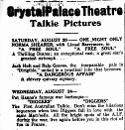AustLit
 4548948898047242218.jpg
4548948898047242218.jpg
Latest Issues
AbstractHistoryArchive Description
Diggers primarily concerns the adventures of two Australian 'cobbers,' Chic Williams and Joe Mulga, who are serving in the A.I.F. in France during 1918. Much of the narrative is based on three of the Famous Diggers' more popular live sketches: namely, an incident involving the stealing of some rum (Rum Doings), the hospital scene where Chic and Joe feign illness (Chic and Joe in Hospital), and a scene set in a French estaminet (Mademoiselle from Armentieres). An unidentified Brisbane review held in the Pat Hanna Collection (Performing Arts Centre, Melbourne) records, for example, that 'Diggers made its Brisbane premiere at the Regent Theatre on Saturday. Many of the incidents have been played by Pat on the Brisbane stage, but they are worth repetition... There was a laugh when Pat feigns deafness in hospital so that he will not be sent to the front lines. He even remains motionless when a revolver is fired next to his ear, but when a champagne cork pops from the bottle it is too much and he reveals the sham' (n. pag.).
In the first sketch, Chic and Joe, who are typically anti-authoritarian, convince a fellow digger, Bluey, to help them steal some rum from the Quartermaster's store. The second sketch is played out in hospital, where Chic, Joe, and Fatty feign battle fatigue and illness in order to avoid being set back up the line. They are questioned by a medical officer who finds all but Chic to be malingerers. Although he successfully convinces the MO that he is the only genuine case (even when a pistol is fired behind his head), Chic later gives himself away by reacting to the pop of a champagne cork. The final sketch is based on the Famous Diggers' theatrical rendition of the song 'Mademoiselle from Armentieres.' Combining a mixture of romance and pathos, the narrative concerns a young French girl and her Australian lover shortly before he returns to the front. She later learns that he has been killed.
Notes
-
A sketch believed to have been written for the film, titled 'Old Soldiers Never Die,' is held in the Pat Hanna Collection (Victorian Performing Arts Centre). A copyright registration script is also held in the National Archives of Australia. It has not yet been ascertained if the sketch was included in the final version of the film. The sketch, which also involves a hospital scene, is set in 1931 at the Old Battalion Annual Reunion.
Publication Details of Only Known VersionEarliest 2 Known Versions of
PeriodicalNewspaper Details
-
cFrance,cWestern Europe, Europe,




